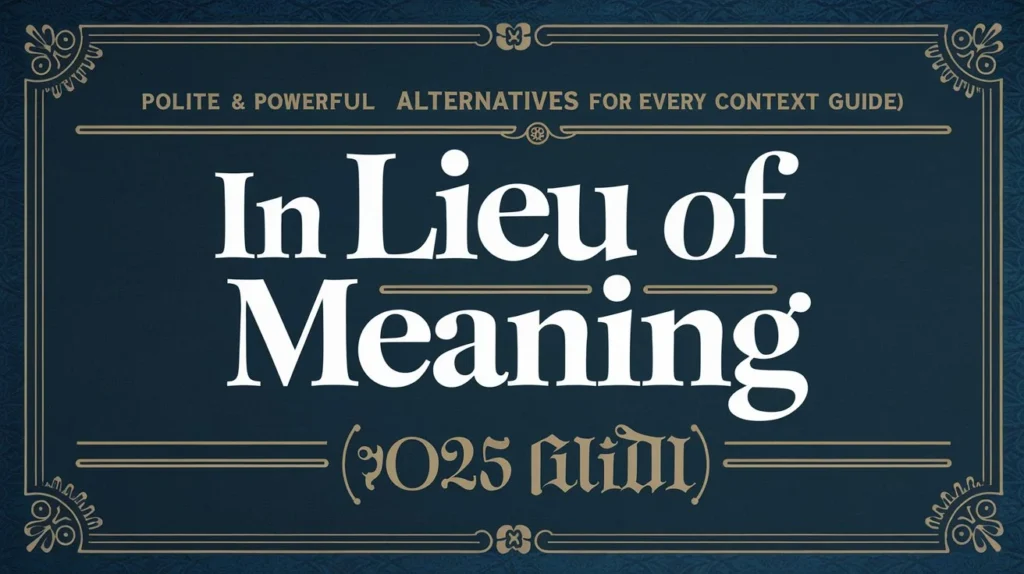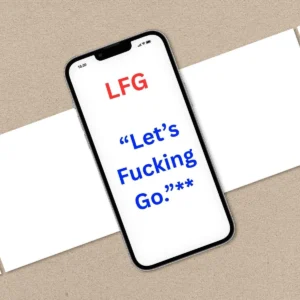When communicating in English—especially in professional or emotionally sensitive settings—the phrase “in lieu of” often arises. But many people still wonder: What does “in lieu of” really mean, and when is it appropriate to use? More importantly, are there better, more natural, or more tactful alternatives?
In this expertly crafted 2025 article, we’ll explore the meaning of “in lieu of”, offer upgraded expressions, and show how to pick the perfect alternative depending on tone, setting, and intention. Whether you’re writing a formal email, giving condolences, or just trying to sound polished, this guide will elevate your language.
🔍 What Does “In Lieu Of” Mean?

“In lieu of” is a formal phrase that means “instead of” or “in place of.” It is often used in professional or ceremonial contexts, such as:
- “In lieu of flowers, please make a donation.”
- “She accepted extra vacation days in lieu of a salary increase.”
While grammatically correct and stylistically acceptable, “in lieu of” can sound stiff or outdated in modern usage. In 2025, contemporary English leans toward more natural and emotionally intelligent alternatives—without sacrificing clarity or formality.
🎯 When Should You Use Alternatives?
Before choosing an alternative, consider:
- Tone – Formal, neutral, casual, or emotional?
- Context – Business, personal, ceremonial, legal?
- Audience – Native speakers, ESL learners, or professionals?
- Purpose – Politeness, persuasion, clarity, or expression?
Let’s now explore some elevated, context-specific alternatives to “in lieu of”—complete with examples, tone analysis, and usage tips.
💡 10 Best Alternatives to “In Lieu Of” (With Examples & Usage Guidance)

1. Instead Of
Tone: Neutral, Common, Universal
Use When: Simplicity and clarity are key.
Example:
- “We’re using digital signatures instead of paper contracts now.”
Why It Works:
This is the most straightforward and widely accepted alternative. It’s natural in speech and writing and suitable for any audience.
2. In Place Of
Tone: Slightly Formal
Use When: Subtle formality is appropriate without sounding archaic.
Example:
- “He worked overtime in place of taking days off later.”
Why It Works:
A modern equivalent that balances tone and elegance, ideal for emails, reports, or documentation.
3. As a Substitute For
Tone: Professional, Academic
Use When: Describing formal replacements or procedures.
Example:
- “As a substitute for on-site meetings, we’ve implemented weekly video calls.”
Why It Works:
Gives the impression of a deliberate and thoughtful exchange, perfect for technical or business writing.
4. Rather Than
Tone: Neutral, Slightly Conversational
Use When: Making a preference or a personal choice clear.
Example:
- “Rather than charging clients monthly, we offer annual billing.”
Why It Works:
Helps express preference while subtly highlighting efficiency or rationale.
5. In Exchange For
Tone: Formal, Financial/Transactional
Use When: A trade or negotiated change is involved.
Example:
- “They received a larger marketing budget in exchange for fewer operational resources.”
Why It Works:
Excellent for business and legal communications. Implies mutual agreement or benefit.

6. To Replace
Tone: Clear, Professional
Use When: Direct substitution is the focus.
Example:
- “The CFO approved additional freelancers to replace full-time hires.”
Why It Works:
Highly specific and action-oriented—perfect for productivity-related writing or decision-based discussions.
7. On Behalf Of (Context-specific)
Tone: Respectful, Representational
Use When: Someone is acting or contributing in someone else’s place.
Example:
- “Donations were made on behalf of the late Dr. Peterson.”
Why It Works:
Conveys grace and representation—often used in public relations, ceremonies, or formal statements.
8. In Memory Of / In Honor Of
Tone: Emotional, Respectful, Ceremonial
Use When: A person or moment is being acknowledged thoughtfully.
Example:
- “In memory of our founder, we planted a tree grove.”
- “In honor of her retirement, we hosted a farewell dinner.”
Why It Works:
Offers a warm, human touch to otherwise formal gestures.
9. Rather Than Opting For
Tone: Analytical, Professional
Use When: Comparing options in strategy or planning.
Example:
- “Rather than opting for short-term funding, we secured a five-year grant.”
Why It Works:
Polished and professional—great for reports, grant writing, or executive summaries.
10. In the Absence Of
Tone: Technical, Conditional
Use When: Indicating lack of availability or conditions.
Example:
- “In the absence of clear evidence, the claim was dismissed.”
Why It Works:
Clarifies that a choice was made due to a limitation or missing element.
🧠 How to Choose the Best Alternative?
Here’s a quick guide to tone-matching your phrase:
| Context | Best Alternative | Why? |
|---|---|---|
| Business Email | In Place Of, Rather Than | Balanced tone, not too stiff |
| Formal Event | In Memory Of, In Honor Of | Ceremonial respect |
| Academic Paper | As a Substitute For, In the Absence Of | Precise and formal |
| Legal/Contract | In Exchange For | Indicates negotiation or terms |
| Friendly Chat | Instead Of | Simple and direct |
Pro Tip for 2025:
Use AI-powered writing assistants (like Grammarly, ChatGPT, or Jasper) to test tone appropriateness before finalizing communication. Language is becoming more context-aware, and you want your wording to align with both your intention and your audience’s perception.
📚 Common Mistakes to Avoid
- ❌ Don’t overuse “in lieu of” in casual writing—it sounds robotic.
- ❌ Avoid using it when talking about human emotions or everyday tasks; it’s too impersonal.
- ❌ Don’t confuse “in lieu of” with “on behalf of”—they’re not interchangeable.
- ❌ Mixing tones in the same paragraph can confuse readers. Be consistent.
💬 Final Thoughts: Make Your Words Count
The English language continues to evolve in 2025, prioritizing clarity, emotional intelligence, and tone-awareness. While “in lieu of” still holds a place in formal communication, you now have ten richer, more adaptable alternatives to elevate your writing and speech.
Whether you’re speaking from a podium, writing an executive summary, or sending a text message, choosing the right phrase will help you sound more intentional, empathetic, and effective.
As you now know, it’s not just about what you say—it’s how you say it.





